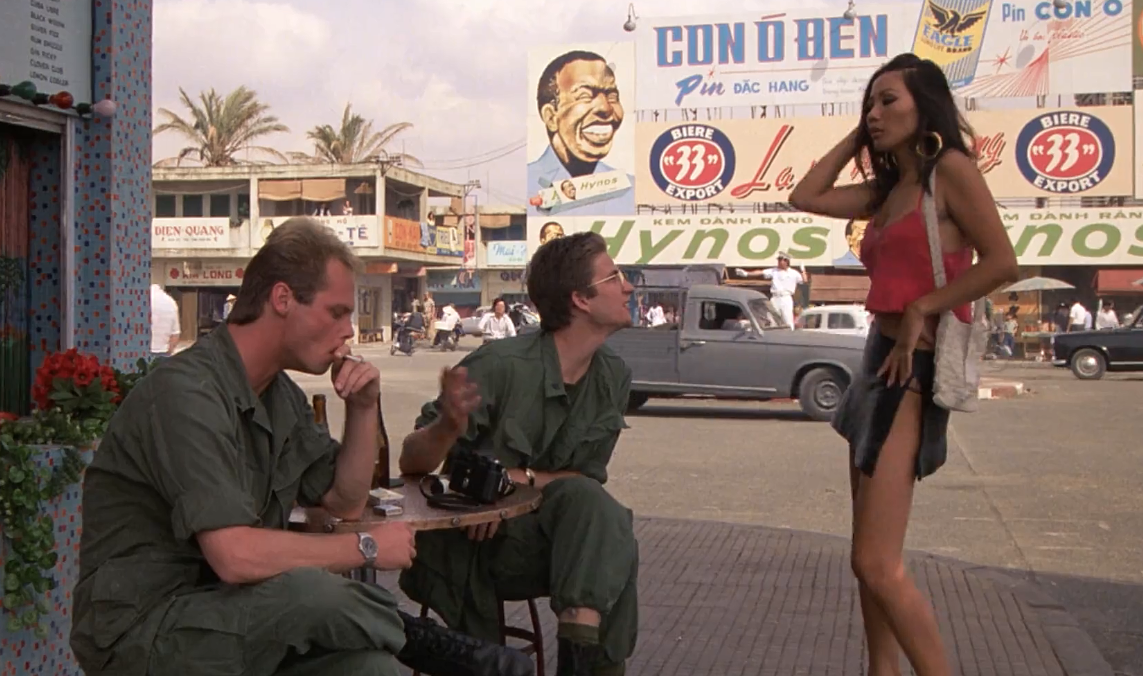Written by guest blogger, Daniel McKay.
Take a look at the picture above, a portrayal of South Vietnam in 1968. It’s a still from Stanley Kubrick’s film Full Metal Jacket (1987), in which a Vietnamese prostitute (played by British-Chinese actress Papillon Soo Soo) solicits the U.S. Marines Joker (played by the American actor Matthew Modine) and Rafterman (played by the Canadian actor Kevyn Major Howard). How problematic is this image? Let me count the ways. As a derivative of casting decisions that collapse the difference between Asians living in Asian countries and, say, British-Born Chinese? Check. As a portrayal of relations between overseas servicemen and local women that reduces the latter to sex objects? Check. As an example of a racialised ‘gaze’ that sees ‘Asian’ women as hypersexual? Check. The list goes on. As against that, however, there remains the disquieting fact that the war in Vietnam did bring servicemen and prostitutes together in large numbers. So is the image historically inaccurate? Alas, no. By the end of the war, the issues, so to speak, were readily apparent. South Vietnam had so many children of mixed-race parentage that evacuating them became part of a military operation in itself.
Fast-forward to the Iraq War and no similar operation has been necessary. On the contrary, the presumption among many civilians is that U.S.-led coalition forces brought about or inhabited a culture that denied them sexual encounters with local women. Iraqis would not ‘love them long time.’ Furthermore, women of East or Southeast Asian descent are no longer expected, by that fact alone, to be foreign rather than domestic. Take the following advertisement, for example, which was commissioned by Apple Inc. during the Iraq War:
After watching this a good few times, I decided that there was more going on here than schmaltzy marketing. While it would be presuming too much to assume that images such as Stanley Kubrick’s are no longer being produced in dominant entertainment media, a shift, at least, appears to have taken place. This led me to enquire into the ways in which today’s writers of Iraq War literature have rethought the old stereotypes of East and Southeast Asian women. Of course, neither Iraq nor Afghanistan are located in those regions, but that’s precisely the point. Might the most recent wars have provided an occasion to rethink the cultural legacies of older ones?
Assuming that the Iraq and Afghanistan wars were interruptions in the social and sexual norms that American servicemen had come to expect, I’m interested in how fiction writers, in turn, have seized the opportunity to break free of those norms when it comes to the craft of storytelling. My chosen sources, Phil Klay’s short Story “In Vietnam they had Whores” (2014) and Atticus Lish’s novel Preparation for the Next Life (2015) come from two of the best-known Iraq War writers today. Both are U.S. Marine Corps veterans and both feature increasingly in discussions of the new canon of writing that is emerging on the Iraq War and its associated episodes.
Sources
- Preparation for the Next Life by Atticus Lish
- Redeployment by Phil Klay
Daniel McKay is an Associate Professor at Doshisha University, Kyoto, Japan. His article “Pivot to Asia: Iraq War Literature and Asian/American Women” can be found in the latest issue of University of Toronto Quarterly. Read it online here (open access for a limited time).

Comments on this entry are closed.